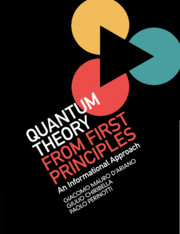2 - Quantum Theory from Hilbert Spaces
from Part I - The Status Quo
Published online by Cambridge University Press: 09 February 2017
Summary
It is not surprising that our language should be incapable of describing processes occurring within atoms, for, as has been remarked, it was invented to describe the experiences of daily life, … Fortunately, mathematics is not subject to this limitation, and it has been possible to invent a mathematical scheme–the quantum theory–which seems entirely adequate for the treatment of atomic processes.
Werner Heisenberg, The Physical Principles of the Quantum Theory (1930)In this chapter we introduce the mathematical structure of quantum theory, for a finite number of systems and finite dimension, starting from three simple Hilbert-space postulates, and based on the intuitive notions of state, transformation, and effect, within a causal context. Such notions will be formalized in a general non-causal context in Chapter 3, which is devoted to the informational framework. We will assume the reader has a basic knowledge of matrix analysis and of operators over Hilbert spaces. Comments about the extension to infinite dimensions, continuous outcome-spaces, and infinitely many systems can be found in the notes at the end of the chapter.
From the three simple Hilbert-space postulates, the present chapter extracts six principles, which will become the postulates for quantum theory in the axiomatic derivation presented in Part III of the book. In addition, we will take the opportunity to present and explore many relevant features of the theory – including its convex and causal structure, the Choi–Jamiołkowski isomorphism, and relevant notions, such as those of POVM, complete positivity of maps, quantum operation and channels, entangled states, state discrimination, tomography of states, and transformations. The purification principle will open the stage to the dilation theorems of the theory of quantum open systems, along with other consequences, such as the existence of faithful and steering states, the theorem of no information without disturbance, quantum teleportation, and more. We will review the quantum no-cloning and no-programming theorems, and finally provide a thorough derivation of the theory of quantum channel inversion, which is the backbone of the general theory of quantum error correction in quantum information. Additional interesting topics will be classical information theory as a restriction of quantum information theory, and a critical reconsideration of the von Neumann postulate and the notion of observable.
- Type
- Chapter
- Information
- Quantum Theory from First PrinciplesAn Informational Approach, pp. 11 - 108Publisher: Cambridge University PressPrint publication year: 2017



